
by Karyn Wills | Feb 10, 2014 | 2014, Awareness, Being Thankful, Brothers, Childhood, Education, Family, Food, Health, Life Balance, Life Lesson, Milestones, Motherhood, Nature, New Zealand, Nutrition, Older Children, Parenting, Relationships, Traditions, Travel, Vacationing, World Motherhood
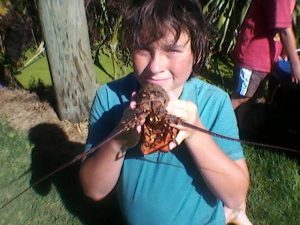 One of my enduring memories of childhood is of trapsing over paddocks, up and down hills, in gumboots too big for my feet picking mushrooms or blackberries. Eventually getting sore heels and aching legs. Eventually filling buckets and ice-cream containers with food.
One of my enduring memories of childhood is of trapsing over paddocks, up and down hills, in gumboots too big for my feet picking mushrooms or blackberries. Eventually getting sore heels and aching legs. Eventually filling buckets and ice-cream containers with food.
Probably scrapping with my sisters. Probably moaning about having to do so. Definitely covered in blackberry juice and scratches on blackberry days. Definitely not impressed by having to pick mushrooms, which I didn’t like to eat.
This summer holiday, my boys got to harvest their own food. Not blackberries and mushrooms, though. They got to harvest seafood.
Tuatua (too-ah-too-ah) are a shellfish. The children love to collect them. We go out at almost low-tide or just after low-tide in thigh-high water. We do the Twist. Our feet sink into the wet sand and feel around for something hard. When we find one, we reach down and pick it up with our hands.
Sometimes, we are side-swiped by a wave. Sometimes, we pick up a round hard sea-biscuit instead. At times, instead of the Tuatua-Twist there is a Crab-Bite-Leap with occasional bad-language. There is almost always laughter and a competition to see who can find the most. This year, the boys and their cousins also took responsibility for collecting fresh seawater twice a day, to keep the Tuatuas in, while they spat out all the sand inside their shells. They kept them cool in the fridge and, when they were finally cooked, the children ate them: some with gusto, others not so much. To me, they taste a bit like chewy seawater…
Our eldest son, 12 year-old Joe, with his 13 year-old girl cousin, Billie, trapped their own crayfish.
Crayfish are related to rock-lobster and, in our extended family, are usually trapped off-shore and by boat, or dived for with scuba-gear and tanks. Joe and Billie had kayaked out around a small peninsula and discovered an old craypot on the rocks. They dragged it out of the sea and managed to convince their fathers to repair it. They then kayaked it out again and dropped it on a good rocky spot.
Each day they went out to check their pot, just as the adults do the other craypots. The first day they caught – seawater. The second day they caught – seawater. The third day they were a bit fed up and otherwise occupied, so didn’t go out. The fourth day or maybe it was the fifth, Billie was out fishing and Joe went out alone to see what was there and to bring the pot in for good. He was very excited to discover they had caught a legal-sized cray! Yes, duly cooked and eaten.
In these days where many children don’t know that carrots grow in the ground or that their meat comes from a real animal, I love that our boys are sometimes involved in the process of food-collection and the processes of preparing it for a meal. I know that these are the Good Old Days and these moments will create some of their childhood memories.
Do your children do similar things you did as a child? Are they involved in collecting or harvesting their own food?
This is an original post to World Moms Blog from our writer in New Zealand and mum of three boys, Karyn Van Der Zwet.
The image used in this post is credited to the author.
Karyn is a teacher, writer and solo mother to three sons. She lives in the sunny wine region of Hawke’s Bay, New Zealand in the city of Napier.
More Posts

by Kyla P'an (Portugal) | Feb 7, 2014 | 2014, Childhood, Culture, Entertainment, Eye on Culture, Family, Family Travel, Holiday, Kids, Marketing, Milestones, Motherhood, Parenting, Traditions, Travel, USA, Vacationing, World Motherhood, Younger Children
 As parents determined to raise global citizens, my husband and I were reticent to channel financial resources toward a Disney-vacation rather than taking our children abroad for enrichment. But, there is something that stirs inside both of us when it comes to celebrating the ephemeral days of childhood that made us reconsider.
As parents determined to raise global citizens, my husband and I were reticent to channel financial resources toward a Disney-vacation rather than taking our children abroad for enrichment. But, there is something that stirs inside both of us when it comes to celebrating the ephemeral days of childhood that made us reconsider.
Here in the US, a visit to Walt Disney World in Orlando, Florida or Disneyland in Anaheim, California is a childhood hallmark. In fact, I have met parents, who began planning their Disney vacation the moment they found out they were pregnant with their first child.
And even though a Disney family-vacation can cost upwards of several thousand dollars (with hotels, park tickets and flights), it doesn’t necessarily mean that parents will wait until their children are old enough to fully enjoy the experience nor, in some cases, are even old enough to remember it; tots, barely able to toddle, are a common site at Disney theme parks. (more…)
Kyla was born in suburban Philadelphia but spent most of her time growing up in New England. She took her first big, solo-trip at age 14, when she traveled to visit a friend on a small Greek island. Since then, travels have included: three months on the European rails, three years studying and working in Japan, and nine months taking the slow route back from Japan to the US when she was done. In addition to her work as Managing Editor of World Moms Network, Kyla is a freelance writer, copy editor, recovering triathlete and occasional blogger. Until recently, she and her husband resided outside of Boston, Massachusetts, where they were raising two spunky kids, two frisky cats, a snail, a fish and a snake. They now live outside of Lisbon, Portugal with two spunky teens and three frisky cats. You can read more about Kyla’s outlook on the world and parenting on her personal blogs, Growing Muses And Muses Where We Go
More Posts - Website
Follow Me:

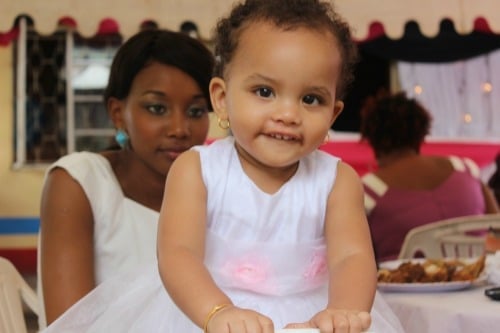
by Nancy Sumari | Feb 6, 2014 | 2014, Family, Nancy Sumari, Siblings, World Motherhood
I grew up in a family of five children, with a year and a half between each child. I remember our household always feeling crowded, and, of course, privacy was unheard of.
The fact that we were three sisters meant that hand me downs and sharing clothing was a huge part of life, and it also meant that I did not always get to enjoy and appreciate my favorite shirt or shoes long enough. Let’s not even mention how much fighting went on. We basically disagreed on and fought over everything! When I think of how much noise and bickering went on, my head starts spinning.
We were five siblings. I often repeat those words in my head just so that I can try to understand exactly how my parents managed to work long hours to provide for us and raise us. They did this all while still managing to maintain good relationships with all of us.
It was always hard for me to wrap my head around how they handled it all, and, therefore, I ended up never wanting a big family.
Every time I say that to someone, who (impolitely) asks if I’m thinking of having a second child, I get gasps and shocking looks. In many of our African and especially Tanzanian families, having and being happy with just one child is rather strange. “Why?” “Are you sure?” “Won’t she be lonely?” Are some of the many questions that come flying at me.
The truth is, I am happy. Yes, with just only one child. It works for us, we are happy, and having a grand time. I am managing perfectly, meshing my schedule with hers. I feel that I’m able to give the best of myself to motherhood this way and in this space. At least in the meantime, that is. I don’t doubt that in the foreseeable future she will start asking for a sibling. *Laughs*
I must say, though, that I do worry. Is it easier to spoil a child if it’s just her? What about narcissism? Is she more susceptible to it because she is often all on her own? What about being a loner? I even worry about the difference it would make in our relationship if, in fact, I do have a second baby. *Crazy mom talking*
How many children do you have? What do you think are the advantages and disadvantages of having only one child?
This is an original post by Nancy Sumari from Tanzania. You can find more of her writing at Mama Zuri.
Photo credit to the author.
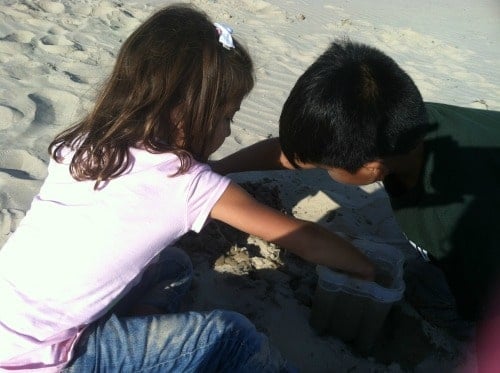
by Meredith (USA) | Jan 24, 2014 | Adoption, Babies, Bedtime Routines, Being Thankful, Birth Parents, Communication, Family, Husband, Infertility, Life Lesson, Motherhood, Parenting, World Motherhood
 I am the first person to admit that I had no clue about adoption before I adopted my son. I remember when I was growing up, I would tease my brothers that they “were adopted”. There was a girl in my first grade class who was adopted, but I was always told not to talk about it to her. I came to think that adoption was something that was a secret, and because it was a secret there might be something wrong with it. (more…)
I am the first person to admit that I had no clue about adoption before I adopted my son. I remember when I was growing up, I would tease my brothers that they “were adopted”. There was a girl in my first grade class who was adopted, but I was always told not to talk about it to her. I came to think that adoption was something that was a secret, and because it was a secret there might be something wrong with it. (more…)
Meredith finds it difficult to tell anyone where she is from exactly! She grew up in several states, but mainly Illinois. She has a Bachelor of Science degree in Elementary Education from the University of Illinois at Champaign/Urbana which is also where she met her husband. She taught kindergarten for seven years before she adopted her son from Guatemala and then gave birth to her daughter two years leter. She moved to Lagos, Nigeria with her husband and two children in July 2009 for her husband's work. She and her family moved back to the U.S.this summer(August 2012) and are adjusting to life back in the U.S. You can read more about her life in Lagos and her adjustment to being back on her blog: We Found Happiness.
More Posts

by Mama B (Saudi Arabia) | Jan 22, 2014 | Bedtime Routines, Childhood, Discipline, Family, Home, Kids, Motherhood, Parenting, Saudi Arabia, World Motherhood
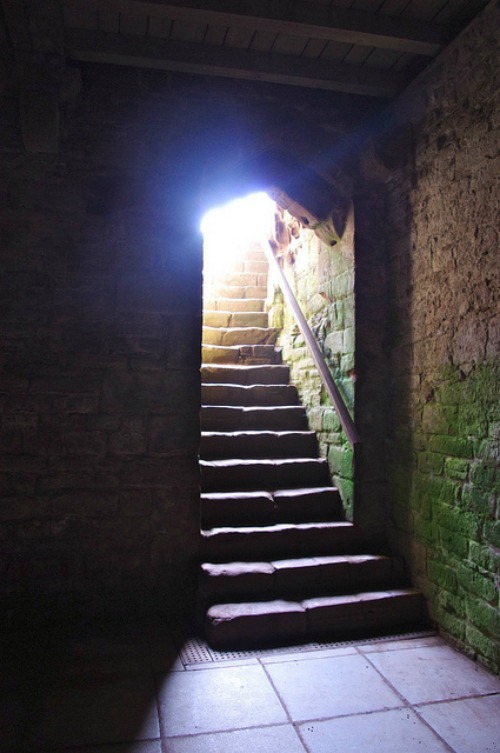 “Your house is a dungeon of rules” is what one of my child’s closest friends said to him last week.
“Your house is a dungeon of rules” is what one of my child’s closest friends said to him last week.
That was a unique way of saying something I’ve heard many times before. “Your house has so many rules!” “Is it true you make them go to sleep at 7 on a weekend?” “Why can’t they play on the iPad during the week?” And “What!!! No coke??”.
Just for the record, my 7 and 10 year old don’t go to sleep at 7 on weekends or on weekdays. They fall sleep anywhere between 8 and 8:30 on weeknights and 9:30-10:00 on weekends. They both wake up at 6:30. Most experts would agree that 10 hours of sleep is healthy and needed. Some might even say that my 7 year old needs more sleep.
Weekdays are screen free unless it’s homework related and yes, it’s true, no coke or any other fizzy drink full of sugar for the kids. I’m not saying they have never had it but it’s not allowed in my house, the “dungeon of rules” house.
Our other house rules include: only healthy unprocessed foods, a blasphemously early dinner time (by Saudi and Arab standards), no eating in front of the TV, limited screen time when they have friends over, no backing out on a commitment (like after school classes, parties or visiting friends), and making eye contact and being polite.
All our house rules feels right to me, like I’m doing what I’m supposed to be doing. So why has a comment made by my son’s 10 year old friend bothered me so much?
I think it’s because I know that the older he gets, the more he will be hearing these kind of comments. Or probably because when I was young, I did live in a dungeon of rules. Unfortunately for my mother, there was no ‘organic’ or ‘natural’ alternatives to the junk others were having.
Growing up, I did feel like my mother imposed too many rules on us.
As an adult, I know I’m a better parent for it. My mother planted the seed of wanting my children to eat well and be healthy in me. She made me realize that children cannot always get what they want, or think they want.
I had a lovely childhood full of freedom and excitement in ways other children never had. For example, I could always choose what I wanted to wear, so I always wore an outfit of a sleeveless top and ruffled skirt that was black with a purple line around the edges. When that was in the wash, I looked like a hobo. We never had a million adults around us all the time just a nanny who didn’t worry about us getting dirty. We explored and imagined and had a whole troop of explorers with us who all had different rules than ours and we survived.
Children now talk more openly to their parents and other adults and I am always amazed at how comfortable they are telling me things I would have never dreamed to say to an adult when I was a child. Maybe that’s the only difference. The fact that I know that our house is called “the dungeon of rules”.
Will my children end up feeling deprived that I don’t let them stay up late? That’s probably the biggest obstacle I have. That, and trying to keep them from eating junk. I can handle being known as the strict mother but can my kids handle being known as the ones with so many rules? (Another gem was when one of their other friends said at dinner “In my house I have no rules! No one says no to me”.)
I am trying something new in my parenting now and it seems to be having a positive effect. I tell them what they’re working towards. They do have rules, but in return for how well behaved, independent and responsible they are (which they really work hard at and achieve brilliantly most days) they get more freedom than any of the kids with ‘no rules’.
I respect them and their opinions. They have the right to say they don’t like a rule and I as a parent have the duty to enforce it. They have choices in their lives and a say in how they want things to go, as long as they continue to prove they’re responsible enough to make them. I’m toughest when I know they’re doing something that is beneath their ability or their character. I find it hard to stay positive in those situations. I believe in them so much that it’s difficult to see them doing something that’s not a reflection of their ability.
Many mothers have told me I’m expecting too much of my children but I’m so immensely proud of them and what they achieve, how self reliant they are in the environment they’re living it, how they take responsibility for their actions and how they effect others. I believe none of that would have happened had I not expected so much of them.
As for the rules, the basic fact of the matter is that children cannot be healthy, happy and productive if they are sleep deprived, have an unhealthy diet and if they rely on passive entertainment such as iPads and TV’s. So, if it takes a dungeon of rules to make them happy and healthy then I’m making a neon sign and sticking it on the roof!
Do you feel you have too many rules?
This is an original post to World Moms Blog by Mama B from Saudi Arabia. She can be found writing at her blog, Ya Maamaa.
Photo Credit to Dave Hamster who holds a Creative Commons Attribution license.

Mama B’s a young mother of four beautiful children who leave her speechless in both, good ways and bad. She has been married for 9 years and has lived in London twice in her life. The first time was before marriage (for 4 years) and then again after marriage and kid number 2 (for almost 2 years). She is settled now in Riyadh, Saudi Arabia (or as settled as one can be while renovating a house).
Mama B loves writing and has been doing it since she could pick up a crayon. Then, for reasons beyond her comprehension, she did not study to become a writer, but instead took graphic design courses. Mama B writes about the challenges of raising children in this world, as it is, who are happy, confident, self reliant and productive without driving them (or herself) insane in the process.
Mama B also sheds some light on the life of Saudi, Muslim children but does not claim to be the voice of all mothers or children in Saudi. Just her little "tribe." She has a huge, beautiful, loving family of brothers and sisters that make her feel like she wants to give her kids a huge, loving family of brothers and sisters, but then is snapped out of it by one of her three monkeys screaming “Ya Maamaa” (Ya being the arabic word for ‘hey’). You can find Mama B writing at her blog, Ya Maamaa . She's also on Twitter @YaMaamaa.
More Posts
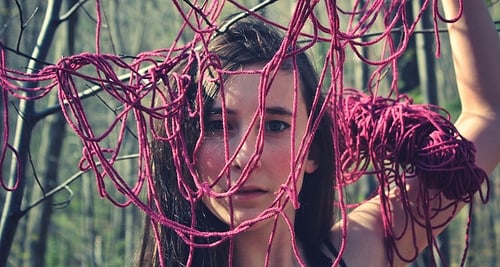
by Ecoziva (Brazil) | Jan 20, 2014 | 2014, Being Thankful, Brazil, Childhood, Education, Family, Inspirational, Kids, Life Lesson, Maternal Health, Motherhood, Parenting, Relationships, Womanhood, Working Mother, World Motherhood
 You know how someone can tell you something that you already knew but in just such a way that finally something “clicks” inside you?
You know how someone can tell you something that you already knew but in just such a way that finally something “clicks” inside you?
That is what I felt when I read Argentinean psychotherapist, Laura Gutman’s, work recently. Laura Gutman’s books are best-sellers in several Spanish speaking nations, where she is known for promoting conscious mothering.
Three of her books have been translated into Portuguese, of which one has also been published in English. I had heard so many good reviews of this particular one (Maternity, coming to face with our own shadow) that I bought it as a Christmas gift for a friend, who is planning on getting pregnant soon. For another friend, I bought a second one, whose title seemed interesting – it could be roughly translated as The power of maternal discourse.
I confess that – after three kids (including a baby), having read tons of parenting books and with restricted time for reading anything unrelated to work – I didn’t plan on tackling either anytime soon. I didn’t really think there would be anything new. However, when I picked up The power of maternal discourse I couldn’t stop. And immediately after I finished I read Maternity...
Yes, a lot of it was not new to me and some parts I did not fully agree with. Yet, overall the way she said it (and all of the case studies she used as examples) made such a difference that it produced somewhat of a revolution in my life, especially in three areas: my relationship with my mother, my relationship with myself and my relationship with my children. In this part I would like to talk about how it affected my relationship with my mother.
For starters, my relationship with my mother wasn’t exactly affected in a positive way, at least not in practice. In fact, we had a huge fight right after I read the book which ended up in us not spending Christmas together. Yet, although unpleasant, it was necessary as we both said things that had been kept inside for years.
One of the main arguments of The power… is that our own personal story is mostly constructed by what the dominant adult in our childhood (usually our mother) said, which is not necessarily accurate or entirely true. Thus, Gutman states, the unsaid truths are often what hold us back, producing our so-called “shadow”.
For those of you unfamiliar with the concept of shadow, it would be our unfaced “dark side”, a side we try to suppress or deny, often at high cost. Additionally, as other authors have argued, we must try to understand, accept and learn from our shadow, and one way to do that would be by trying to reconstruct and examine our true life story.
The power… is not an optimistic book. In fact, from her decades as a therapist, the author believes most people’s lives have been tainted by some sort of childhood abuse. Of course her definition of abuse is ample, yet the examples she brings are quite distressing.
I guess what resonated most with me were her writings on “childish mothers”. More specifically, how many mothers – despite providing adequate physical care for their children and apparently being present – are often emotionally absent and overly self-involved, which results in the child carrying out the mother’s role in many situations. Then, when this child becomes a mother (or a father) the unresolved child within them will make them act childish and emotionally unavailable with their own child(ren) and so on.
Although her ideas were not exactly new, as I said, for some reason many things finally clicked. When adults we all know are parents are flawed and we might even understand and forgive these flaws, yet in practice these flaws may still be hard to deal with. Although we may rationally believe that our mother/father did the best they could to raise us, with the tools and knowledge they had at that moment in their lives – the hurt child in us might still dominate our emotions in practice.
In my case, many things I carried around as being my “fault” were really my mother’s responsibility, and that was surprisingly hard to admit and accept.
On the other hand, Gutman encourages us to step into the adult we are now and make our own choices by understanding and accepting the truth about our past. And hopefully engaging in a better relationship with ourselves and with our own children, which is what I am trying to do now!
And you? How have you dealt with issues related to your own parents? How has resolving (or not) these issues helped you in your relationship with your children?
This is an original post to World Moms Blog from our writer in Brazil and mother of three, EcoZiva.
The image used in this post is credited to photographer martinak15. It holds a Flickr Creative Commons attribution license.
Eco, from the greek oikos means home; Ziva has many meanings and roots, including Hebrew (brilliance, light), Slovenian (goddess of life) and Sanskrit (blessing). In Brazil, where EcoZiva has lived for most of her life, giving birth is often termed “giving the light”; thus, she thought, a mother is “home to light” during the nine months of pregnancy, and so the penname EcoZiva came to be for World Moms Blog.
Born in the USA in a multi-ethnic extended family, EcoZiva is married and the mother of two boys (aged 12 and three) and a five-year-old girl and a three yearboy. She is trained as a biologist and presently an university researcher/professor, but also a volunteer at the local environmental movement.
More Posts

 One of my enduring memories of childhood is of trapsing over paddocks, up and down hills, in gumboots too big for my feet picking mushrooms or blackberries. Eventually getting sore heels and aching legs. Eventually filling buckets and ice-cream containers with food.
One of my enduring memories of childhood is of trapsing over paddocks, up and down hills, in gumboots too big for my feet picking mushrooms or blackberries. Eventually getting sore heels and aching legs. Eventually filling buckets and ice-cream containers with food.






 I am the first person to admit that I had no clue about adoption before I adopted my son. I remember when I was growing up, I would tease my brothers that they “were adopted”. There was a girl in my first grade class who was adopted, but I was always told not to talk about it to her. I came to think that adoption was something that was a secret, and because it was a secret there might be something wrong with it.
I am the first person to admit that I had no clue about adoption before I adopted my son. I remember when I was growing up, I would tease my brothers that they “were adopted”. There was a girl in my first grade class who was adopted, but I was always told not to talk about it to her. I came to think that adoption was something that was a secret, and because it was a secret there might be something wrong with it. 






